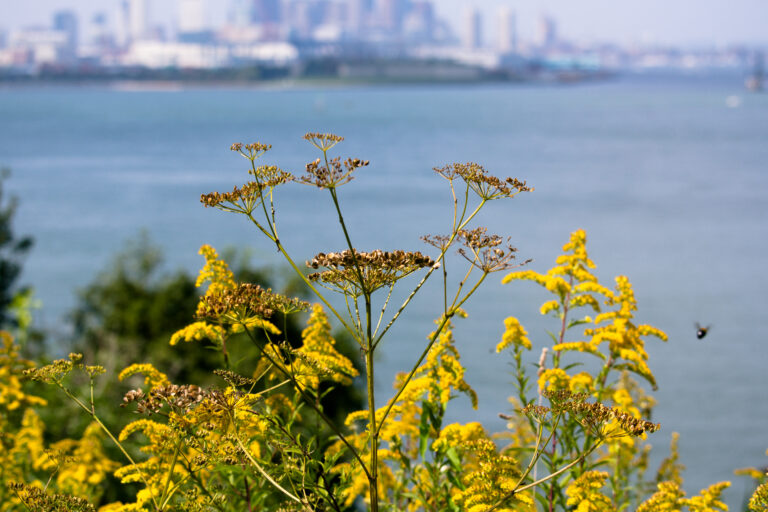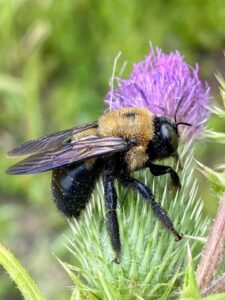Pollinators

More than thirty years ago, before my daughter was born, I had the opportunity to travel around the British Isles. One beautiful, sunny day, I found myself on a trail through the most glorious blooming heather on the moors of Exmore in Southwest England. The purple blossoms carpeted the ground as far as the eye could see. Walking along, I heard a humming, and realized the heather was covered with honeybees! I mean covered and I was in the middle of thousands of them! “No worries,” said a fellow hiker, “just ignore them. They won’t sting.”
Honeybees are one of thousands of pollinators that include butterflies, bumblebees, beetles, moths, bats, hoverflies, leafcutter bees, hummingbirds and more. These pollinators feed on a plant’s nectar, picking up pollen as they do so. The pollen is then distributed to the next plant, insuring the propagation of fruit and the survival of the plant. More than a hundred crops, such as apples, strawberries and almonds depend upon the pollinators to produce the fruit we consume.
As you visit the Harbor Islands this summer, you are sure to see pollinators flitting from flower to flower. Don’t worry, they are not there to sting you, but remember to admire them from afar. Over the past few seasons, our Natural Resource Partnerships team has been busy planting and caring for native plant species, and safely removing invasive species. The native plants are harmonious with the islands’ ecosystems. Pollinators depend on these plants for nectar, and the plants depend on pollinators to reproduce. The field work that park staff carry out helps to protect and restore the delicate balance of these relationships.
Many pollinators, such as bumblebees, are threatened due to habitat destruction, disease, poison and climate change. Without pollinators, our food supply would be severely depleted, and the beauty of the natural world would no longer exist. But all is not lost. June 21-27 is National Pollinator Week—a time to show appreciation for, learn about, and protect the incredible pollinators in your area. This week, we encourage you to create pollinator habitats and to help protect these vital faunae. Check out the resource list below for fun ideas and activities.
Helping in Your Backyard – Pollinators (U.S. National Park Service) (nps.gov)
Gardening for Pollinators (fs.fed.us)
Pollinator Week | Pollinator.org
So, remember , when you are on the islands, enjoying the natural scene, pollinators are working hard so nature itself will survive and thrive.
Sincerely,
Julia Mize (Editor of the Boston Harbor Islands E-Newsletter)

Bee on thistle, Grape Island.
NPS / Emily Parnell